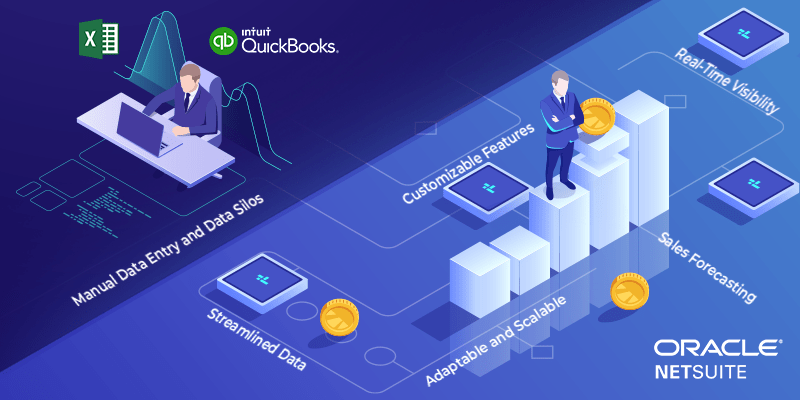Resources
NetSuite
NetSuite ERP accounting software: How it outperforms spreadsheets and QuickBooks?
NetSuite ERP accounting software: How it outperforms spreadsheets and QuickBooks?

In today’s fast-paced business environment, relying on manual processes like spreadsheets or limited software like QuickBooks can hinder growth. NetSuite ERP stands out as a modern solution for businesses seeking to streamline their accounting processes. This blog explores how NetSuite ERP excels over spreadsheets and QuickBooks in various ways, offering businesses the automation, scalability, and real-time insights they need to grow efficiently.
Why Spreadsheets and QuickBooks Fall Short
As businesses grow, the limitations of spreadsheets and QuickBooks become glaring. Both tools are suitable for small operations, but they struggle to keep up with growing complexities.
Manual Data Entry
Spreadsheets require constant manual updates, increasing the likelihood of human error. While slightly better, QuickBooks still requires manual reconciliations, leading to time-consuming tasks and inaccuracies.
Lack of Real-Time Data
Spreadsheets and QuickBooks lack real-time synchronization, making it difficult to get up-to-the-minute insights into financial health.
Scalability Issues
Both tools struggle to scale as businesses grow, especially when dealing with multiple departments, locations, or global operations.
These pain points often become bottlenecks, hindering businesses from making informed decisions and responding quickly to changing market conditions.
How NetSuite ERP Transforms Accounting Operations
1. Real-Time Data and Automation
NetSuite ERP provides real-time data synchronization, offering businesses a clear, up-to-date view of their financials. This eliminates manual data entry and reconciliation, drastically reducing errors and improving efficiency
2. Scalability for Growing Businesses
As businesses expand, they require systems that grow with them. NetSuite ERP offers scalability, supporting complex business structures such as multi-entity, multi-currency, and multi-location setups.
Example:
A mid-sized eCommerce business expanded into international markets. With QuickBooks, they will face challenges with multi-currency and multi-country operations. NetSuite’s built-in global financial management features can help them streamline their international growth, reducing compliance risks and simplifying global accounting.
3. Automated Financial Processes
NetSuite automates key financial processes like accounts payable/receivable, invoicing, and payroll, allowing businesses to save time and focus on growth strategies. Automation also ensures compliance with tax regulations, reducing the risks associated with human error.
Example:
Automation leads to faster month-end closes, accurate tax filings, and fewer bottlenecks in financial reporting.
4. Advanced Reporting and Analytics
NetSuite ERP goes beyond standard reporting, offering advanced analytics and customizable dashboards. Businesses can generate real-time reports on cash flow, profitability, and other KPIs, helping decision-makers stay informed.
5. Comprehensive Financial Control
NetSuite ERP offers robust financial controls, supporting audit trails, role-based access, and full compliance with international accounting standards (GAAP, IFRS). This level of control helps businesses mitigate risks, especially as they scale.
Feature:
The system’s built-in compliance tools allow businesses to adhere to various financial regulations, reducing the risk of errors during audits or tax season.
Why Businesses Are Switching from QuickBooks and Spreadsheets to NetSuite ERP
As businesses grow, they quickly realize that basic accounting tools like QuickBooks and spreadsheets cannot meet the demands of complex operations. These limitations, including data integrity risks and poor reporting capabilities, drive businesses toward NetSuite ERP, which offers:
- End-to-end financial management
- Automated workflows
- Scalable infrastructure
Switching to NetSuite ERP ensures efficient operations and positions businesses for sustainable growth.
Comparison: NetSuite ERP vs. QuickBooks and Spreadsheets
Here’s a quick breakdown of how NetSuite ERP outperforms QuickBooks and spreadsheets:
Feature |
NetSuite ERP |
QuickBooks |
Spreadsheets |
|---|---|---|---|
| Scalability | Fully scalable for large operations | Limited scalability for smaller firms | No scalability for growing businesses |
| Automation | High-level automation across functions | Limited automation | No automation |
| Real-Time Data | Yes | Limited real-time features | No real-time updates |
| Reporting & Analytics | Advanced, customizable reporting | Basic reporting | Manual reporting |
| Global Financials | Supports multi-entity, multi-currency | Limited global support | No global support |
Conclusion: Choose NetSuite ERP for Long-Term Growth
NetSuite ERP becomes the obvious choice as your business grows to manage complex financial operations, automate workflows, and provide real-time insights. Spreadsheets and QuickBooks, while suitable for smaller businesses, simply cannot keep up with the demands of a scaling enterprise. With NetSuite, businesses gain access to a robust, scalable solution that supports their growth and provides a competitive edge.
Check out how we helped one of our clients from the IT/ software industry to make order management seamless and effective with custom ERP solutions.

Author: Mythili Putrevu
Director – ERP Advisory & NetSuite Solutions
Director – ERP Advisory & NetSuite Solutions
Driving to place Amzur as one of the biggest NetSuite consulting firms globally, Putrevu says that she comes in prepared and ready to invest in people, technology, and the domain knowledge.




